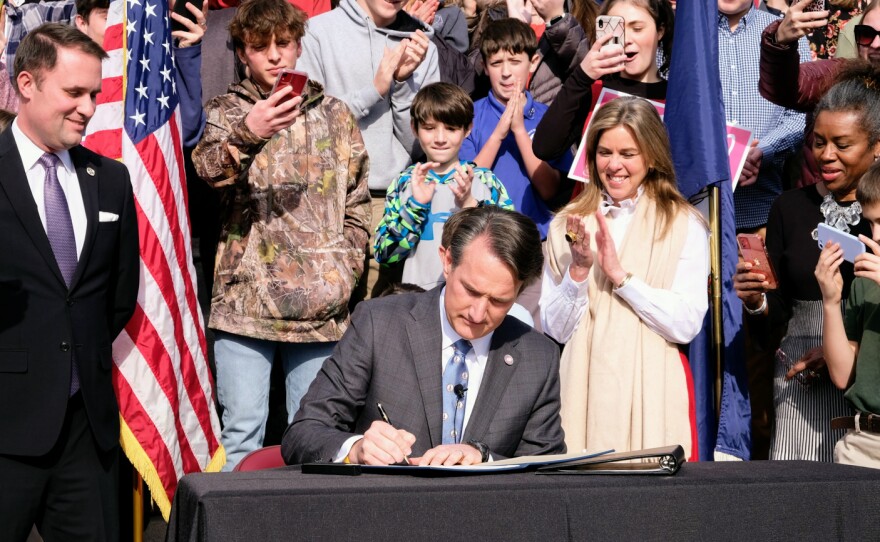Editor's note: This article was updated Feb. 17 at 9:29 a.m.
Students in Virginia’s K-12 schools will no longer have to wear a mask under legislation signed by Gov. Glenn Youngkin on Wednesday.
Starting March 1, parents can opt out of local mask mandates in a move that echoes an executive order pushed through by Youngkin on his first day in office. While that order has been bogged down in several lawsuits, a surprise legislative push aided by a Democratic senator allowed Youngkin to accomplish the same maneuver through the General Assembly.
Youngkin signed the bill on the steps of the Capitol. Democrats noted the contrast with his predecessor, former Gov. Ralph Northam, who used the backdrop when he signed legislation expanding Medicaid to hundreds of thousands of low-income Virginians.
But for Youngkin, the bill was a notable bright spot in a month where many of his campaign promises were defeated by Democrats in the state Senate. Youngkin was flanked by dozens of students, some holding signs saying “We unmasked the kids.”
“Children have not only suffered learning loss, they’ve suffered relationship loss,” Youngkin said. “We will get back to normal. And this is the path.”
Youngkin added language to the bill emphasizing it doesn’t take away the governor’s ability to create new executive orders in the face of future public health threats. School districts are required to comply with the order by March 1, but some announced they were taking immediate action to allow students to classes unmasked. Masks will still be required on school buses to comply with federal rules.
Still, Democrats and some local school officials warned the legislation, which does not include a sunset date, could leave students vulnerable in the event of a different COVID-19 variant or future pandemic. Del. Marcus Simon (D-Fairfax) argued Republicans also violated procedural rules to speed up the passage of the legislation, though Speaker of the House Todd Gilbert (R-Shenandoah) said Democrats used similar tactics when they were in the majority.
“This has been a rush to give the governor a much-needed political win,” Simon said. “This is bad policy, poorly executed in violation of the state constitution.”
Three Democrats in the state Senate joined Republicans to pass the legislation: Sen. Chap Petersen (D-Fairfax), Sen. Joe Morrissey (D-Richmond), and Sen. Lynwood Lewis (D-Accomack); one Republican, Sen. Emmett Hanger (R-Augusta) voted against it. Petersen has been especially outspoken against requiring all students to wear masks and worked behind the scenes with the Youngkin administration to instigate the change.
Carl Tobias, law professor at the University of Richmond, says he thinks the legislative update provides a pathway for Youngkin and Attorney General Miyares to ask an Arlington judge – who temporarily granted seven school districts the right to keep mask mandates in effect – to dismiss the lawsuit.
“I think they may just go to the judge and ask her to dismiss it or say it's no longer applicable because of mootness,” Tobias said. “And mootness just says there isn't an existing case or controversy anymore. And that is the probable effect of what the General Assembly has done.”
University of Richmond law professor Hank Chambers says there are still unanswered, interesting constitutional questions at play in the cases.
“I think part of the issue will be how the court interprets the constitutional provision that suggests that school boards are responsible for dealing with local issues. Because clearly, the legislation still matters. And the General Assembly can put various laws into place,” Chambers said. “But the question is, how closely do the school boards have to follow the particular legislation? So it'll be interesting to see what courts do with that particular piece of the puzzle.”
Chambers says there are other questions that courts haven’t yet answered. One of them, Cambers says, is “how far should the governor push his agenda on education?”
Another, he says, is how much control should the governor have over local schools, particularly outside of an emergency situation.
“It’s one thing to say that the governor has certain powers in an emergency. It's another thing to say the governor has certain powers regardless of whether there's an emergency or not,” Chambers said.
Meanwhile, Tobias says the ACLU’s lawsuit – claiming Youngkin’s executive order violates the Americans with Disabilities Act – likely won’t be affected by the state legislative update.
“I think that might go forward because it's a federal claim,” Tobias said.
Speaking to reporters on Wednesday, Youngkin said he hoped the legislation “will put everything to bed” when it comes to legal challenges to his executive order.
“I'm looking forward to hopefully all those lawsuits going away,” Youngkin said.
Correction: A previous version of this article stated that two Democratic Senators voted for the legislation. The correct number is three. We have updated the article and apologize for the error.



